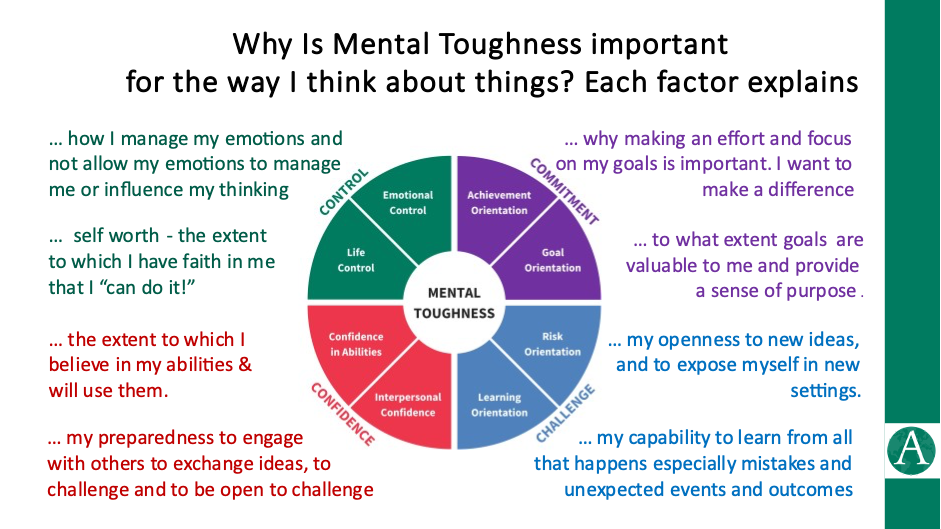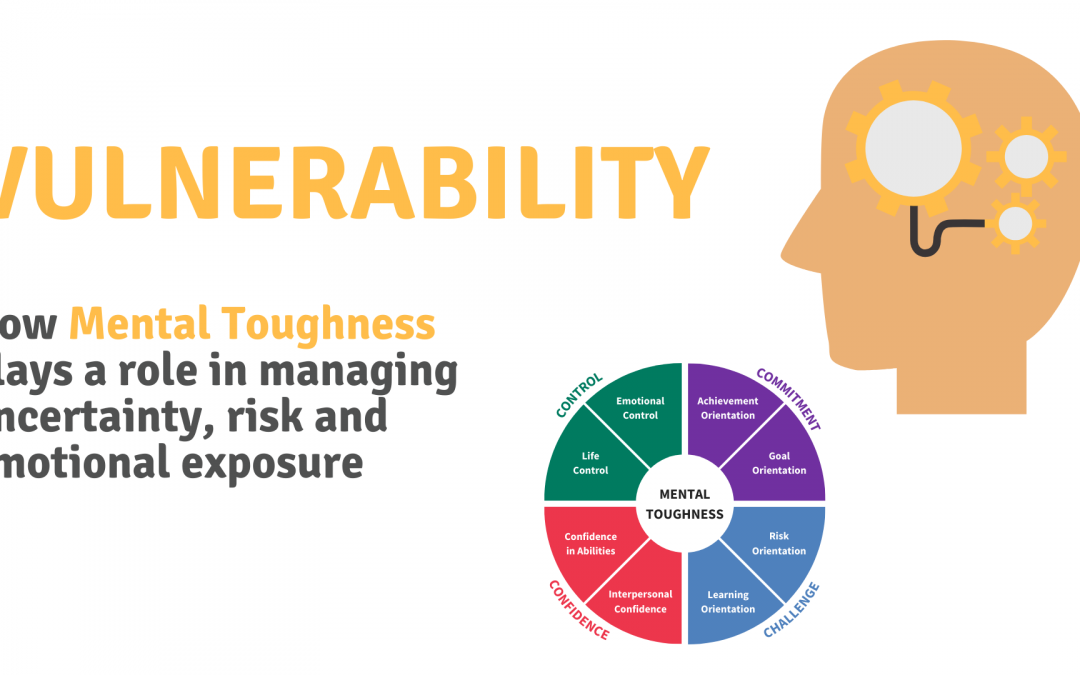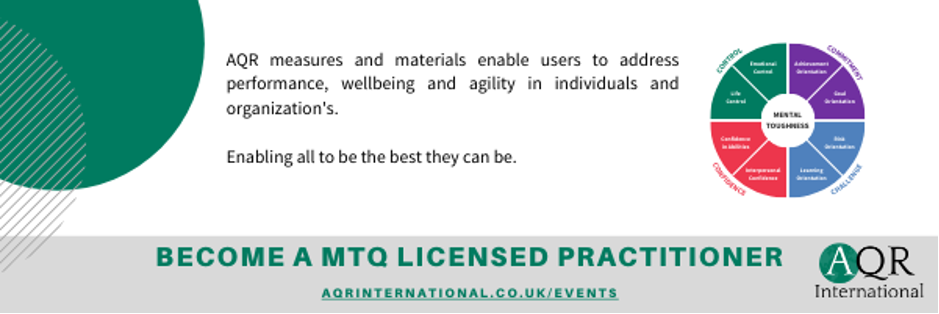What is meant by Vulnerability?
Vulnerability is a term that has entered the world of people and organisation development in recent years, popularised by Brené Brown by means of some bestselling books and a widely viewed TED talk.
This article examines Brown’s conceptualisation, what it is and whether and how the 8-factor version of the 4Cs mental toughness concept may offer some useful insights. We think it does.
If we look up Vulnerability in the OED we get this definition – “The exposure to being harmed or attacked”. Most dictionaries echo this with some suggesting a sense of being weak and easily hurt physically or emotionally.
Brown suggests something different for the same term – she suggests it is more about courage.
“The definition of vulnerability is uncertainty, risk, and emotional exposure.
But vulnerability is not weakness; it’s our most accurate measure of courage.
When the barrier is our belief about vulnerability, the point Brown seeks to address is
“Vulnerability is not winning or losing; it’s having the courage to show up and be seen when we have no control over the outcome.”
A closer examination of her work indicates that may be three elements of vulnerability that need to be acknowledged and managed. These are; uncertainty, risk and emotional exposure. Brown often speaks about curiosity as a central component.
In a discussion with Adam Grant on the TED podcast WorkLife, they discussed vulnerability as a vehicle for building trust.
In recent months, we have posted articles on both curiosity** and trust*** which show a potentially close relationship to the 8 factors in mental toughness.
It is not intended here to explore Brown’s work on vulnerability in depth. She has written several books about this. The goal here is to look at the essence of her work and to explore how the mental toughness concept has the potential to shine a light on it.
If we are to do something about our vulnerability then we need to become self-aware of our own potential for vulnerability. The mental toughness questionnaire, MTQPlus, might just be of value here.
To start with, we might think that when Brown talks of vulnerability, she is really talking about recognising our own sensitivities and making sense of them. Brown emphasises ‘meaning making’ on which there is significant research.
‘Meaning making’ seems to have some resonance with aspects of learning orientation. This is often described as the extent to which an individual reflects on what happens to them or around them. However, reflection for some can go beyond “what happened?” and “why did that happen?”. For some, the reflection might be “why did it affect me as it did”?
It could be argued that having such mental sensitivities are fine when the prevailing situation is stable and favourable. However, it could leave someone “vulnerable” (in the traditional sense of the word) in adverse/pressuring situations.
Perhaps, engaging with one’s own sensitivities and understanding them might be a mechanism for developing mental toughness.
Brown’s description of vulnerability is really more about being aware of your insecurities and being prepared to engage with them.
It comes with a type of courage. She defines it as being prepared “to tell the story of who you are with your whole heart”. It is a kind of authenticity that she acknowledges is likely to have some boundaries.
It also seems to come with compassion – ‘the emotional response, when perceiving discomfort, that comes with a genuine desire to help”. Compassion towards ourselves and others has been associated with greater psychological well-being and connection. Brown asserts that compassion starts with our own identity.
It is useful to look at the work of Professor Paul Bloom described in his book “Against empathy, the case for rational compassion”. It is not what it seems at first. His observations are thought-provoking.
Although Steve Peters doesn’t use the term “vulnerability”, he talks about “gremlins” – those little negative thoughts we have that pop-up, particularly during those times of high pressure/stress. That little thought that asks “am I really good enough to be in this position?” which now goes by the name “impostor syndrome”.
It seems that this is what Brown is really getting at, recognising that you need to engage and understand these vulnerabilities/gremlins/insecurities to be able to manage them.
This way of thinking aligns with mental toughness.
The mental toughness perspective
One of the misconceptions of the mental toughness concept is you shut out these vulnerabilities/gremlins/insecurities. That’s not “being comfortable in your own skin” – that stoic sense that is captured in the mental toughness concept.
To be truly mentally tough, you can recognise that you have insecurities and bad memories that sometimes cause an irrational, emotional response when under pressure, but you’re ok with that. You understand why that thought or emotion is there, it’s just not helpful to experience that right now, so you choose to focus on something more helpful.
Recognising or even showing vulnerability in oneself is not implicitly mentally tough or mentally sensitive. In a similar way to which we understand emotional control, it is not the existence of the vulnerability or emotion that is indicative of mental toughness, but the extent to which we are able to acknowledge it and choose whether it is beneficial for us to focus on or show to others at that time.
For example, a middle manager might experience vulnerability and decide to show this to their staff as a way of normalising it and encouraging people to be comfortable in the workplace.
If, however, their senior manager has a more antiquated view of how one should remain “controlled”, the same middle manager might decide it is not advantageous to present such vulnerability in that context.
Such recognising and reasoning are indicative of mentally tough processes that drive behaviour. So, does the mental toughness concept help here? We often represent the concept in the form of the pizza image which summarises the 8 factors. This is shown below:

It is important to understand that this is not a description of “good and bad” or even strengths and weaknesses. Each factor represents a scale with mental toughness with regard to that factor at one and mental sensitivity at the other. At each point of the scales, there is advantage and disadvantage.
Whether it emerges as a strength or a weakness depends partly on the situation.
It is a framework for self-awareness – to understand who you are and why you think about what happens to you the way you do.
Brown places risk at the heart of vulnerability. This resonates well with the Challenge construct. We can see being more mentally tough in terms of risk orientation and learning orientation, especially the openness to reflection, as being more likely to embrace vulnerability.
Vulnerability also requires a degree of courage and confidence. This is where the Confidence construct might be important. Having confidence in your own abilities is a component of self-efficacy. Having a degree of interpersonal confidence addresses the requirement to engage with others and not be unduly concerned about what others think.
The Control construct brings a sense of self-worth, also a component of self-efficacy. Emotional Control addresses the idea that you will experience emotions that are often unhelpful but that you are able to manage them in a way that reduces their impact.
Finally, the Commitment construct addresses the idea of having purpose, something to which you value and aspire together with the sense that you are motivated to make the effort to achieve your purpose, even if that means exposing yourself to vulnerability in so doing.
It’s not difficult to see how an individual who is more mentally tough than the norm on all factors is likely to be “more comfortable in their own skin” and more comfortable with showing their vulnerability to themselves and to others.
Can everyone show vulnerability and prosper?
But what about the more mentally sensitive? If vulnerability is such a positive, how might the more mentally sensitive respond?
Sensitive individuals are not necessarily mentally sensitive on all factors. In fact, this is a much more typical position than being totally tough or sensitive on all factors.
This begs a number of questions. Perhaps the two most important might be;
Firstly, will vulnerability necessarily be a “good thing” for those who are more mentally sensitive and who feel every bump in the road on the journey through life? This includes those who are more mentally sensitive on some factors which matter to that individual.
Next, it is likely that the more mentally sensitive will require support to help them achieve this kind of vulnerability. How can we ensure that this support is available when needed and that it is consistent?
Sensitivity is very different from vulnerability. Exposure to stressors for the mentally sensitive without help could push them into a state where the more common definition of vulnerability – the inability to cope – might apply.
The purpose of this article is not to critique Brown’s idea of vulnerability. It can resonate with what a more mentally tough individual could do – respond to life taking it all in their stride and worrying little about the views of others.
The purpose is to use the lens of the 8-factor mental toughness framework to look at this from another perspective to broaden the discussion from “it’s a good thing isn’t it” to “is it always a good thing?” and “when might we need to be careful?”.
As ever people are complex. It’s never “one size fits all”.
For more information about Mental Toughness see www.aqrinternational.co.uk.
To learn how to be a licensed user of the mental toughness concept and the MTQPlus measure, contact headoffice@aqr.co.uk
The article is co-produced by
Doug Strycharczyk, AQR International
Dr John Perry, University of Limerick, Ireland
Professor Peter Clough, AQR International
*Brené Brown, Braving the Wilderness: The Quest for True Belonging and the Courage to Stand Alone
https://strategiesforinfluence.com/brene-brown-leadership-courage/



